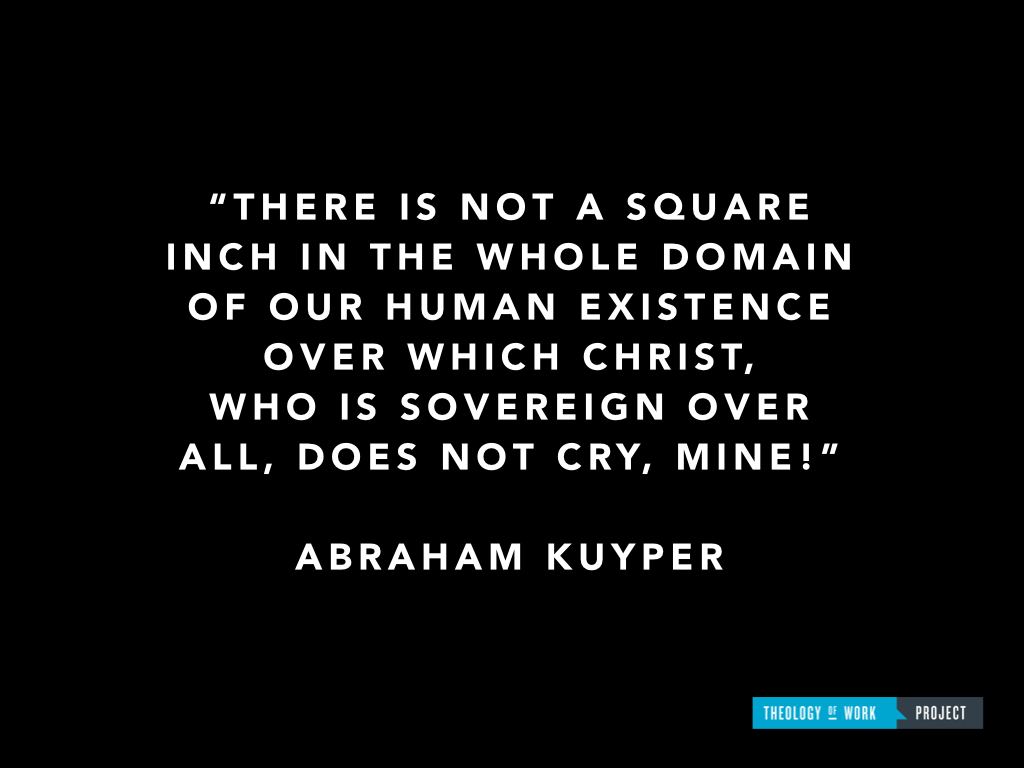Work is an essential component of God’s kingdom. The book of Matthew recounts Jesus’ actions and teachings to show us how God intends us to live and work in his new kingdom.
As followers of Jesus, we live in two worlds. Our work may be subject to unspoken expectations, which may or not be in accordance with God’s ways. At the same time, as Christians we are subjects of God’s kingdom, committed to his values and expectations. In telling the story of Jesus, Matthew shows us how to navigate the world using God’s compass.—He constantly points us toward the world’s true identity as the “kingdom of heaven.” This kingdom “has come” to earth, even though it has not yet become completely realized here. Until it comes to completion, Jesus’ followers are to live and work according to God’s call as “resident aliens” in this present world.
Lesson 1: Jesus’ call upon us is radical and life-changing.

When Jesus called the first disciples (Matt. 4:18-22; 8:18-22; 9:9), they left their livelihoods to follow him, with no guarantee of worldly or material success.
Does a call from Jesus mean that we have to stop working at our current job and become a preacher, pastor, or missionary? Are these passages teaching us that discipleship means abandoning nets and boats, saws and chisels, payrolls and profits?
The answer is no. Even during Jesus’ time on earth, not all believers quit their jobs to follow him. He had many followers who remained in their homes and occupations.
Jesus’ calling may not change what we do for work, but it will change why we do it, and how we go about it. —We may remain in our workplaces. We may perform the same tasks. But now we employ our work to serve the new kingdom and our new master. We still work to bring home a paycheck, but at a deeper level we also work to serve people, as Jesus did.
Lesson 2: In every aspect of our lives, including our work, our character can reflect hope in God’s coming kingdom.
Several passages in Matthew highlight how outward behavior will change as we grow in our relationship with Jesus.
For example, the parables in Matthew encourage us to cultivate our own faithfulness and trustworthiness by diligently investing our gifts, time and efforts in God’s kingdom. (Matt. 19:16-30; 20:1-16; 20:20-28; 21:33-41; 24:45-51; 25:1-13; 25:14-30)
Similarly, the beatitudes (Matt. 5:1-12) depict the kind of kingdom-oriented character that should mark every believer. These are worth exploring in detail.
Poverty of Spirit
To be poor in spirit is to recognize, with humility, our own limits and need for God’s grace. In the workplace, being poor in spirit means having an honest appraisal of our own work and seeking God’s strength to help us live out His call in the workplace.
Mourning
The blessing of mourning means that we are saddened by the evil we face in the world, which might possibly occur in our workplaces. Acknowledging our own sin and brokenness, as well as forgiving (or confronting) ourselves and others, takes courage.
Meekness
A biblical understanding of meekness is “power under control.” In the workplace, this means: 1) refusal to inflate our own self-estimation; and 2) reticence to assert ourselves for ourselves. We exercise power, but for the benefit of all people, not just ourselves.
Righteousness
In ancient Judaism, righteousness meant “to acquit, vindicate, restore to a right relationship. [David Noel Freedman, vol. 5, The Anchor Yale Bible Dictionary (New York: Doubleday, 1996), 737.] The righteous are those who maintain right relationships—with God and with the people around them.
Mercy
Being merciful means treating people better than they deserve from us. Forgiveness is a type of mercy. So is aiding someone whom we have no obligation to help, or forbearing to exploit someone’s vulnerability. At work, mercy has many highly practical applications. We are to aid others to attain their best outcomes, regardless of how we feel about them. When you assist a co-worker, whom you may not like and who may even have wronged you in the past, you are showing mercy. When you are the first contestant in an audition and you warn the later contestants that the judge is in a foul mood, you are showing mercy, though it may give them an advantage over you. When a competitor’s child is sick, and you agree to reschedule your presentation to the client so your competitor won’t have to choose between caring for the child and competing for the business, you are showing mercy.
An environment of forgiveness at work can also help organizational performance, since employees can feel more comfortable admitting mistakes. As Soichiro Honda said, “Success can only be achieved through repeated failure and introspection. In fact, success represents the 1 percent of your work that only comes from the 99 percent that is called failure.” [Tom Peters, Thriving on Chaos (New York: Knopf, 1987), 259-66.] Organizations don’t have the opportunity to learn if mistakes are not brought forward.

Purity of Heart
A pure heart denotes integrity, singleness of devotion and undivided loyalty. Integrity goes well beyond avoiding deceit and bad behavior. The root of integrity is wholeness, meaning that our actions are not choices we put on or take off as may seem convenient, but stem from the whole of our being.Purity of heart arises not from perfection of our will, but from reception of God’s grace.
We can determine how much of this blessing we have received by asking ourselves: How much commitment do I have to integrity, when I might be able to get away with skillful deception? Do I refuse to let my opinion of someone be shaped by gossip and innuendo, no matter how juicy? To what extent are my actions and words accurate reflections of what is in my heart?
Persecution
The reality in a fallen world is that if we demonstrate genuine righteousness, we might be rejected. For example, if you speak up for—or merely befriend—people who are victims of gossip or discrimination in your workplace, you might experience persecution. If you are the president of a trade association, and you speak out against an unfair subsidy your members are receiving, they may not re-elect you. Again, we are reminded that working in a fallen world requires courage.
Lesson 3: True leaders serve others.
True leadership is not self-promoting nor does it come from greatness in the world’s eyes. True leadership is service and care for others. (Matt. 20:20-28)
The servant is the person who knows his or her spiritual poverty (Matt. 5:3) and exercises power under God’s control (Matt. 5:5) to maintain right relationships. The servant leader apologizes for mistakes (Matt. 5:4), shows mercy when others fail (Matt. 5:7), makes peace when possible (Matt. 5:9), and potentially endures unmerited criticism when attempting to serve God (Matt. 5:10) with integrity (Matt. 5:8). Jesus set the pattern in his own actions on our behalf (Matt. 20:28).

Lesson 4: Followers of Jesus treasure God’s coming kingdom over the money and possessions of this world.
The Christian’s relationship to money is a precarious one; we must be careful to remember that in work all that is earned is a gift from God. Wealth, in turn, can be re-invested or stewarded for the common good. In all our work, we can consciously remind ourselves to keep God’s coming kingdom and his ways as our central motivation. (Matt. 6:19-34; 10:5-15; 19:16-30)
Lesson 5: “There is not a square inch in the whole domain of our human existence over which Christ, who is Sovereign over all, does not cry, Mine!” ― Abraham Kuyper
Christians often assume that our lives are to be split into two realms, the secular and the sacred. Our work can become merely a way of earning a living, a secular activity with no godly significance. Going to church and personal devotion are assumed to be the only sacred elements of life. A misreading of Matthew could support this split. The kingdom of the earth could represent the material, secular parts of life; and the kingdom of heaven, the sacred, ethereal parts. But a true reading of Matthew is that both kingdoms include all of life. The kingdom of God has both material and spiritual aspects, and so does the kingdom of the fallen earth. The Christian way is to put our entire life, including our work life, at the service of God’s kingdom, which Christ is bringing to earth even now.
Jesus calls his followers to live and work in the midst of the fallen world, while holding fast to God’s purposes, virtues, and principles. For individual Christians, the sacred and the secular cannot be separated. “No one can serve two masters” (Matt. 6:24). In this universe created and sustained by God, there is no “secular” space, immune to his influence, out of his control, or upon which he does not claim sovereignty.
What do you think? How have you applied these lessons from Matthew in your workplace? Let us know in the comments.
This post is fourth in a five part Theology of Work Project blog series on “Must-Study Books of the Bible for a Theology of Work.” Previous posts included: Genesis, Nehemiah and Revelation.













